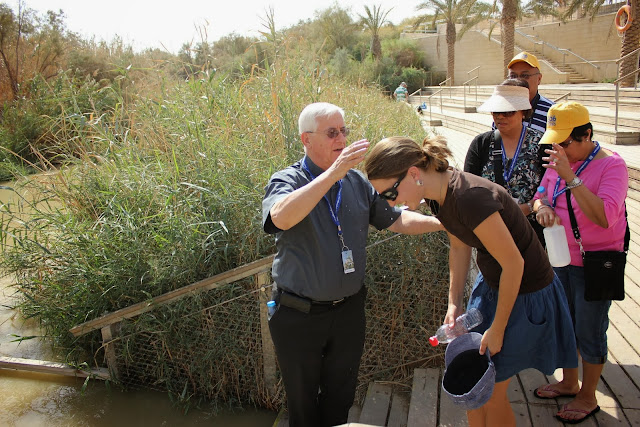Day 5-
The rest of our pilgrimage was spent in Jerusalem and the surrounding areas. While in Jerusalem we had a bit more insight to the lives of Palestinians versus Israelis. Within Israel 75% of the people are Jewish; only 35% of those are orthodox Jews. The other 25% are Arabs. 10% of the Arabs are Christians and the rest are Muslims.
Palestinians are Arabs, a small percentage are Christians and the rest Muslim.
The Israeli–Palestinian conflict is the ongoing struggle between Israelis and Palestinians that began in the 20th century. (or since biblical times) Ongoing battles wage between the Arabs and the Jews over governmental control and land. In 1967, the Six Day War broke out and Israel seized the Gaza Strip from Egypt, the West Bank from Jordan and the Golan Heights from Syria. And to this day those areas are controlled by Israel. During the last 47 years tension has remained high between the Arabs and the Jews.
In year 2000, the second Intifada broke out when the Israeli Prime Minister entered a mosque. Suicide bombers and acts of terrorism were initiated by the Palestinians and the Israelis retaliated with military force. Hence, a wall was built much like the Iron Curtain to separate the 'West Bank' (Palestine) from Israel. Security sky rocketed and to this day it is extremely difficult for a Palestinian to enter Israel. There are work passes granted, but highly selective. A Palestinian much be a certain age, clear background, a small window of time to enter and exit Israel per day, and at any moment the police can refuse him right of entrance.
The Israeli government definitely suppresses the Palestinians. For instance, a Palestinian family is only allotted a bath tub of water per week. Nasser had sympathies with the West Bank because he was originally a Palestinian, but was 'grandfathered' in during the unrest in the 1950s. (Currently, a Palestinian could never become an Israeli citizen.) Needless to say, he trumped up how unjust the Israelis were, which is true. But on the other hand, many of the Palestinians are bluntly, Muslim extremists. And frankly, if the Palestinians were allowed to run amuck there would be great blood shed. Does that condone Israel? No........who has the answer? Nobody. The Arab-Jewish conflict runs so deep I don't think it will be ended until Christ's second coming.
The Gaza Strip, West Bank and Golan Heights now controlled by Israel.
The wall separating the West Bank from Israel. A wall was also constructed around the Gaza Strip.
The settlements(above) are yet another source of strife between the Palestinians and Israelis. During the last 10 years, Israel seized sections of the West Bank and erected entire towns on the land. Walls surround the communities and major highways have been built connecting the settlements to Israel. The highways also have huge barriers on either side to protect the Israeli citizens while commuting. Within the settlements the residents can have all the luxuries of Israel: water, schools, parks, pools, etc. although technically the 'oasis' lies in the West Bank.
Bottom line, the Israelis want to slowly push the Palestinians out completely. Large numbers left during the 1948 Palestinian Exodus. And Israel keeps infringing on the Palestinians land with these settlements.
It really is a mess. The political leaders go around in circles arguing about a two state agreement. Before that can happen however, these questions would have to be answered: What would happen to the settlements? Would the refugees be allowed to come back? Who would get Jerusalem? And personally, I think those questions will remain unanswered for ever.
Shepherds Fields
We celebrated Mass in a cave near Bethlehem, similar to what Jesus would have been born in. The cave dated to the time of Jesus. I appreciated visiting the cave more than the Church of the Nativity, which would have been the probable spot of the actual cave where Jesus was born. Its kinda a shame these huge churches have been built over the holy spots. To me, the places seem less impressive with a magnanimous shrine completely obliterating what it actually looked like.
Miniature Model of Old Jerusalem
Alex and I thought this was one of the coolest things we saw. It was an gigantic model of Old Jerusalem. I am just gonna make a few notes because I don't want to forget, but it probably won't make sense to a person reading this.
-Mount Zion was inside the old wall.
-Calvary was right outside the wall to the west.
-City of David was to the south of the temple.
-Place of Judgement was to right of temple. (Pontious Pilate would have been in Jerusalem at the time of Crucifixion to keep order during Passover. And this is where he interrogated Jesus.)
-High Priests house was on Mount Zion.
-Pool of Bethesda was to North of the Temple.
-The palace was on the Western side of the city.
-Kidron and Ghena valleys met at south side of city wall.
The weather couldn't have been better! Low 80s and sunny everyday!
Our motel sat several blocks from the old city, so after dinner we adventured in to Old Jerusalem. Most of the roads within the old city are too small for cars. Shops and restaurants line the tiny alley ways. Of course, we got a little turned around. I kept telling Alex, "We need to ask for directions....you have no idea where we are." And in true fashion, he kept assuring me he knew exactly how to get out of the old city. So....we wandered from the Christian quarter to the Armenian quarter to the Jewish quarter and finally dead ended at the Muslim quarter. There was security monitoring the entrance to the Muslim section, which we were not allowed to enter for safety reasons. Finally, I ran in to a shop and asked for directions. I was getting a little nervous as all the shops started to close. Those alleys were getting pretty dark!






















































